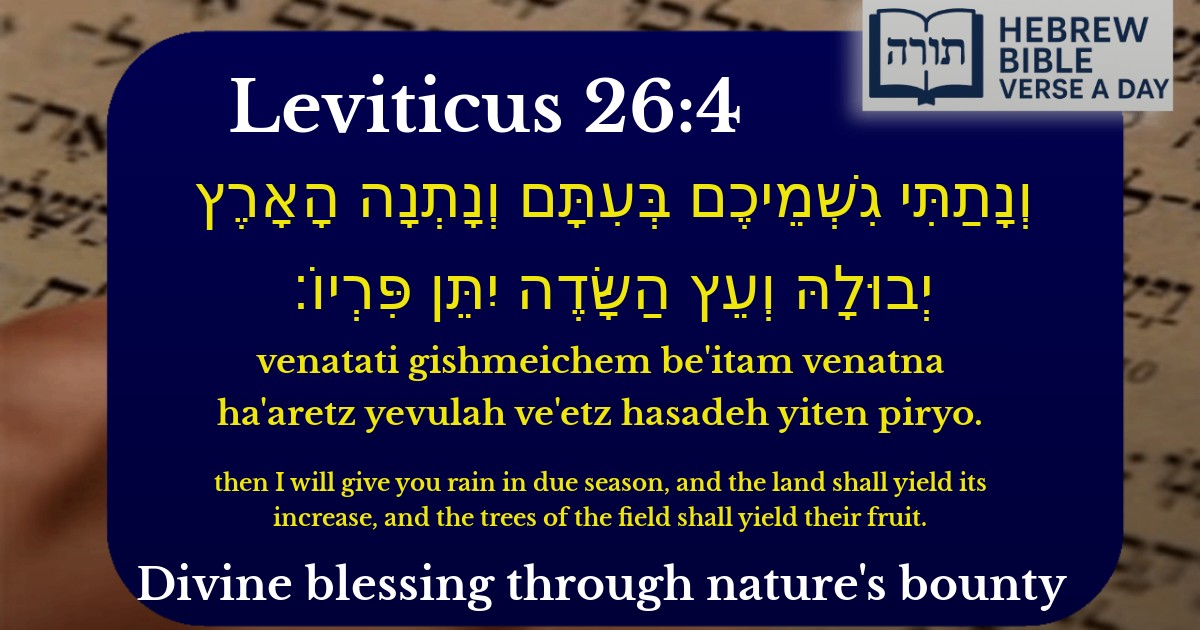Join Our Newsletter To Be Informed When New Videos Are Posted
Join the thousands of fellow Studends who rely on our videos to learn how to read the bible in Hebrew for free!
Hebrew Text
וְנָתַתִּי גִשְׁמֵיכֶם בְּעִתָּם וְנָתְנָה הָאָרֶץ יְבוּלָהּ וְעֵץ הַשָּׂדֶה יִתֵּן פִּרְיוֹ׃
English Translation
then I will give you rain in due season, and the land shall yield its increase, and the trees of the field shall yield their fruit.
Transliteration
Venatati gishmeichem be'itam venatna ha'aretz yevulah ve'etz hasadeh yiten piryo.
Hebrew Leining Text
וְנָתַתִּ֥י גִשְׁמֵיכֶ֖ם בְּעִתָּ֑ם וְנָתְנָ֤ה הָאָ֙רֶץ֙ יְבוּלָ֔הּ וְעֵ֥ץ הַשָּׂדֶ֖ה יִתֵּ֥ן פִּרְיֽוֹ׃
וְנָתַתִּ֥י גִשְׁמֵיכֶ֖ם בְּעִתָּ֑ם וְנָתְנָ֤ה הָאָ֙רֶץ֙ יְבוּלָ֔הּ וְעֵ֥ץ הַשָּׂדֶ֖ה יִתֵּ֥ן פִּרְיֽוֹ׃
🎵 Listen to leining
Parasha Commentary
📚 Talmud Citations
This verse is quoted in the Talmud.
📖 Ta'anit 2a
The verse is referenced in the context of discussing the importance of rain in its proper time as a sign of divine favor and blessing.
📖 Megillah 17b
The verse is cited in relation to the blessings of the Amidah prayer, specifically the blessing for the years (Birkat HaShanim), which asks for rain and agricultural prosperity.


Divine Blessings for Observance
This verse (Vayikra 26:4) appears in the Torah portion of Bechukotai, where Hashem promises abundant blessings for Bnei Yisrael if they follow His commandments. Rashi explains that "rain in due season" refers to rain that falls at the most beneficial times - such as Friday nights when people are indoors, demonstrating Hashem's kindness even in the manner He brings sustenance.
The Agricultural Cycle as Reward
The Ramban notes that the sequence of blessings follows the natural agricultural cycle but emphasizes that these will only come in their proper measure when Israel is worthy. The land yielding its increase ("yevulah") refers to abundant produce beyond normal expectations, as the term implies something extra (from the root "yovel" - to bring forth).
Three Levels of Blessing
The Sforno identifies three distinct blessings in this verse:
Spiritual Parallels
The Midrash (Torat Kohanim) draws a parallel between these physical blessings and spiritual rewards - just as the rain comes at the proper time for maximum benefit, so too Torah study bears fruit when pursued diligently at the proper times. The "trees of the field" represent Torah scholars whose wisdom benefits the community.
Conditional Nature of Blessings
Rabbi Samson Raphael Hirsch emphasizes that these blessings are contingent upon our spiritual state. The verse begins with "then" ("v'natati"), making clear this is the result of proper observance. The natural world responds to our moral conduct, with agricultural success being a barometer of our relationship with Hashem.